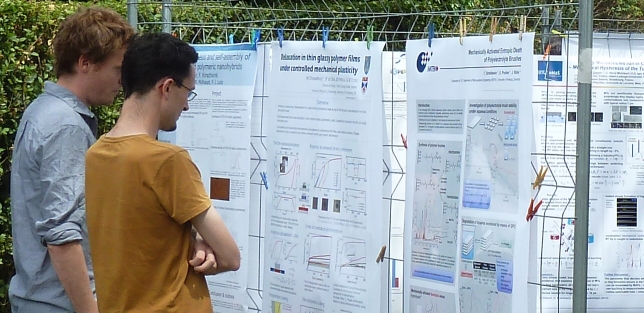SoMaS Summer School 2016: Scientific Programme

LECTURES, RESEARCH SEMINARS AND TUTORIALS
Every lecture (3 hours altogether) will be illustrated by two research seminars and a tutorial during which the young researchers shall explore the topic more deeply with the lecturer after having gone through his/her lecture.
Single-molecule transport through nanopores: Ubiquity, challenges, and opportunities Murugappan Muthukumar, University of Massachusetts, Amherst, MA, USA |
Self-assembled macromolecular membranes and nanostructures Min-Hui Li, Chimie ParisTech, Paris, France ♦ Amphiphilic macromolecules for self-assembly into membranes and vesicles
Research seminars Nanoparticle and lipid nanodomain insertion in the membrane of large and giant copolymer vesicles Olivier Sandre, Université de Bordeaux, France
Wolfgang Meier, Universität Basel, Switzerland |
Tailored self-assembling amphiphilic block copolymers as stable membrane scaffolds for protein based biosensors Luke Theogarajan, University of California, Santa Barbara, CA, USA ♦ Ion channels Research seminars Membrane stabilization through bilayer interdigitation and its effects on phospholipid vesicle morphology Andreas Zumbühl, Université de Fribourg, Switzerland
Justin Rofeh, University of California, Santa Barbara, CA, USA |
Cells interacting with micro- and nanostructured surfaces Joachim Rädler, Ludwig-Maximilians-Universität, München, Germany ♦ Physics of polymer-functionalized interfaces
Membrane as matchmaker for cell adhesion Ana-Suncana Smith, Universität Erlangen, Germany Multilayers of polyelectrolytes: application in the biomaterial field Fouzia Boulmedais, Université de Strasbourg, France |
All students shall present a poster during the poster sessions. The posters will be put up at the beginning and will be displayed for the whole time of the school. Regarding the poster sessions please send an abstract (one page) presenting the results and the main questions of your research project and the strategies to solve them.The best poster will be awarded.
CAREER PROSPECTS
Time management - How to master your research day and PhD project Matthias Mayer, Seminare & Coaching, Berlin, Germany A distinguishing feature of a research career is the unstructured nature of the job. Doctoral students, postdocs, and professors are generally masters of their own time. Although this autonomy can be liberating, it can also result in tremendous inefficiency if one does not develop effective time-management tactics. This short workshop covers the most important techniques of time management to master your research and PhD. You will hear about methods to plan in the long term but also how to structure your daily work. You will learn about an effective method for setting priorities, how to work with maximum concentration and how to leave current time killers behind. Goals Content Methods |

